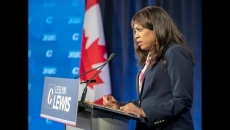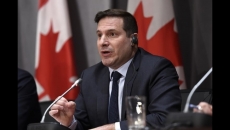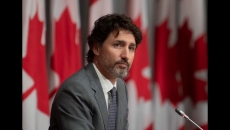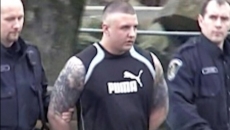One of the oldest professional football teams in the United States is finally confronting a franchise identity after decades of criticism that it's racist — but experts say that's no reason for Canada to be smug about its own troubled history with Indigenous Peoples.
Washington's National Football League team, sideswiped by the racial reckoning that began upending institutions and toppling statues across the country two months ago, announced this week it was dropping an 87-year-old name and logo long deemed offensive to members of the Indigenous community.
Canadians might be tempted to think they're farther along than the U.S. when it comes to Indigenous rights — "Indian" and "native," still in common use south of the border, are forbidden slurs in a country that now regularly acknowledges when public events take place on ancestral lands.
Ten of Canada's 338 members of Parliament are Indigenous, just shy of the 2015 record of 11; only four of the 535 members of Congress can say the same. Issues like treaty rights, Idle No More and child welfare on First Nations reserves have dominated Canadian headlines but rarely get much ink south of the border.
And where Prime Minister Justin Trudeau has made Indigenous priorities a cornerstone of his Liberal government's stated agenda, albeit to mixed reviews, the closest U.S. President Donald Trump has come has been to slap a nickname of his own — "Pocahontas" — on Democrat firebrand Sen. Elizabeth Warren for once claiming a measure of Native American lineage.
Canada, however, is far from a paragon of virtue when it comes to Indigenous Peoples, said Lynn Gehl, an Indigenous scholar and author living in Peterborough, Ont.
"We can't really compare the United States and Canada, putting Canada in this great light. It's dangerous, actually, and it does a disservice to the issue of racism," said Gehl, whose latest book is "Claiming Anishinaabe: Decolonizing the Human Spirit."
Two separate inquiries, she noted — the Truth and Reconciliation Commission's exploration of residential schools, which released its final report in 2015, and the public inquiry into missing and murdered Indigenous women and girls, which wrapped up last year — concluded that Canada had been engaged in long-standing and ongoing campaigns of genocide.
Nor is Canada immune to christening sports teams with racially insensitive or outright offensive nicknames.
The Edmonton Eskimos, one of the Canadian Football League's most successful franchises, are under growing pressure to abandon a name that critics say is a derogatory, colonial-era term for Inuit. And in Morden, Man., a minor-league hockey team faces similar demands to drop the same moniker just abandoned in Washington.
"Nation-states use sports, such as football and soccer and hockey, to shape their citizenry," Gehl said. "Icons and symbols are really powerful tools for shaping our consciousness. And if nation-states are allowing team sports to use these racist icons and names, then their citizenry is going to be racist."
Controversial team names persist throughout the major and minor leagues in both countries, including baseball's Atlanta Braves and Cleveland Indians, the Kansas City Chiefs of the NFL and thousands of college teams across the continent, where terms like "Savages" and "Redmen" still persist, said Chase Iron Eyes, a prominent U.S. Indigenous activist and lead counsel for the North Dakota-based Lakota People's Law Project.
"Canada has concocted this image of the nice guy to the north," Iron Eyes said.
"In Canada, the fact that Indigenous nations are asserting their own voices and are also being promoted by and interfacing with Canadian mainstream media like the CBC, that's going to cause a different experience. So it is friendlier, but it's still just as insidious and deadly."
The struggle is no different in Canada than it is in the U.S., he added.
"We're all trying to rewrite a new social contract — Indigenous nations, they want their independence," Iron Eyes said.
"Canada also is a capitalist economy just like the United States. They want their resources. And they're run by corporations. So it's going to be a continuing class struggle, but one in which those differences that we've been assigned — like a race, colour, creed, religion — we're shedding those."
The name change in Washington had been a long time coming, but when it came, it came quickly.
After the city took down tributes to team founder George Preston Marshall, who named the team, pressure from major sponsors like FedEx and Nike proved the tipping point, prompting the team to announce a review of the name that owner Dan Snyder had vowed for decades never to change.
Ten days later, the name and logo were history. A replacement has yet to be chosen.
Time will tell whether the move will lead to lasting discussion in the U.S. not about team nicknames, but the myriad social issues plaguing Indigenous communities, said Becca Gercken, a professor of American Indian literature at the University of Minnesota Morris.
"It's a good thing, but I wonder what it means in terms of staying power," Gercken said.
"Will we sort of go back to what I think is largely the default setting in this country, which is, 'Why are you guys still asking for stuff? Don't you have enough? Why are the Indians always fighting for stuff?'"
Iron Eyes, however, sees no asterisk in the fact that the move was driven by dollar signs.
"Capitalism is being exposed at its roots," he said. "Even though it seems like it's a symbolic victory, as far as for the intellectual and spiritual liberation of all of our citizenry, mainly in Canada and the United States, it's going to work wonders."
He also pointed to another colossal win for Indigenous communities: The U.S. Supreme Court decided last week that much of eastern Oklahoma, including much of the city of Tulsa, where President Donald Trump staged a smaller-than-planned campaign rally last month, is part of "Indian Country" — land promised to the Creek Nation in an 1866 treaty with Congress.
Whether the next campaign rally in Tulsa sees a presidential contender acknowledge he's standing on tribal territory remains to be seen — it will be a Democrat before a Republican, Gercken said. But Iron Eyes sees the decision as undeniable progress.
"It will have real-life consequences," he said.
"Americans and Canadians who don't want to see First Nations or American Indians living in absolute squalor and poverty need to help inform the government to stop the oppressive legal, political and economic stratification that is represented by a non-recognition of the treaty relationship."






